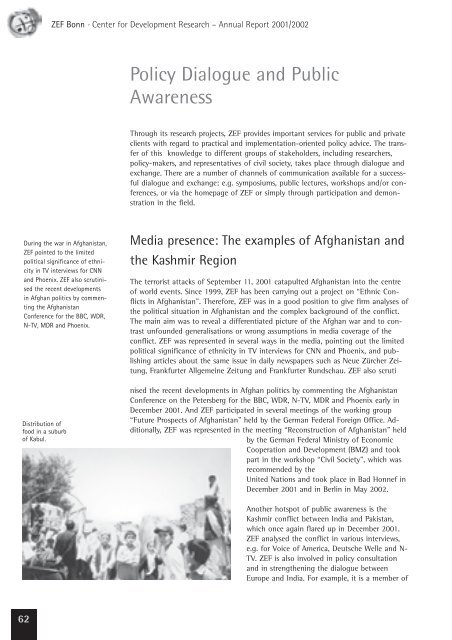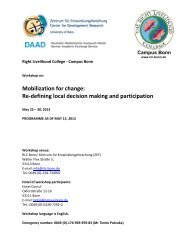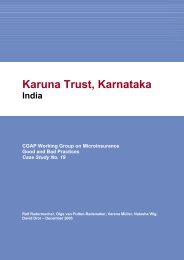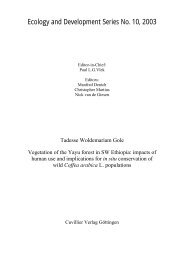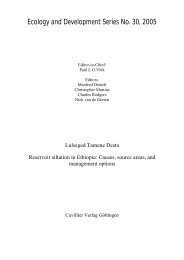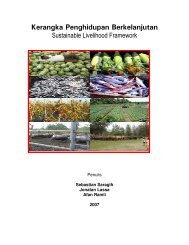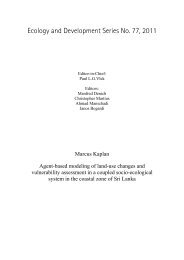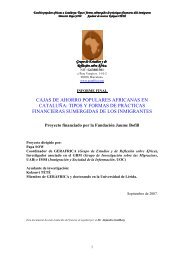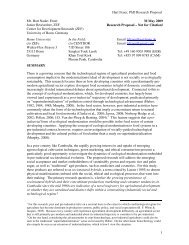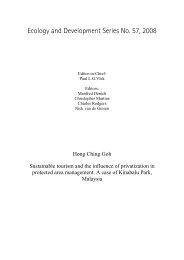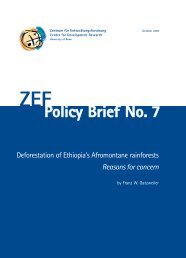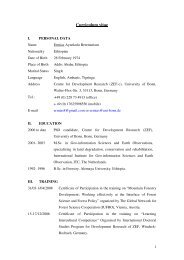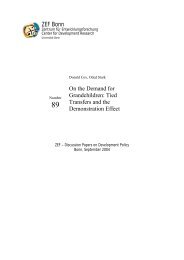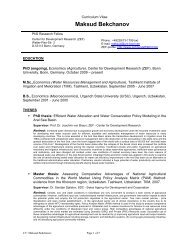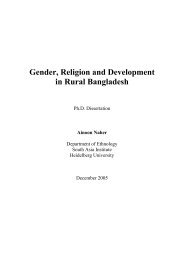ZEF Bonn
ZEF Bonn
ZEF Bonn
Create successful ePaper yourself
Turn your PDF publications into a flip-book with our unique Google optimized e-Paper software.
62<br />
<strong>ZEF</strong> <strong>Bonn</strong> ● Center for Development Research – Annual Report 2001/2002<br />
During the war in Afghanistan,<br />
<strong>ZEF</strong> pointed to the limited<br />
political significance of ethnicity<br />
in TV interviews for CNN<br />
and Phoenix. <strong>ZEF</strong> also scrutinised<br />
the recent developments<br />
in Afghan politics by commenting<br />
the Afghanistan<br />
Conference for the BBC, WDR,<br />
N-TV, MDR and Phoenix.<br />
Distribution of<br />
food in a suburb<br />
of Kabul.<br />
Policy Dialogue and Public<br />
Awareness<br />
Through its research projects, <strong>ZEF</strong> provides important services for public and private<br />
clients with regard to practical and implementation-oriented policy advice. The transfer<br />
of this knowledge to different groups of stakeholders, including researchers,<br />
policy-makers, and representatives of civil society, takes place through dialogue and<br />
exchange. There are a number of channels of communication available for a successful<br />
dialogue and exchange: e.g. symposiums, public lectures, workshops and/or conferences,<br />
or via the homepage of <strong>ZEF</strong> or simply through participation and demonstration<br />
in the field.<br />
Media presence: The examples of Afghanistan and<br />
the Kashmir Region<br />
The terrorist attacks of September 11, 2001 catapulted Afghanistan into the centre<br />
of world events. Since 1999, <strong>ZEF</strong> has been carrying out a project on “Ethnic Conflicts<br />
in Afghanistan". Therefore, <strong>ZEF</strong> was in a good position to give firm analyses of<br />
the political situation in Afghanistan and the complex background of the conflict.<br />
The main aim was to reveal a differentiated picture of the Afghan war and to contrast<br />
unfounded generalisations or wrong assumptions in media coverage of the<br />
conflict. <strong>ZEF</strong> was represented in several ways in the media, pointing out the limited<br />
political significance of ethnicity in TV interviews for CNN and Phoenix, and publishing<br />
articles about the same issue in daily newspapers such as Neue Zürcher Zeitung,<br />
Frankfurter Allgemeine Zeitung and Frankfurter Rundschau. <strong>ZEF</strong> also scruti<br />
nised the recent developments in Afghan politics by commenting the Afghanistan<br />
Conference on the Petersberg for the BBC, WDR, N-TV, MDR and Phoenix early in<br />
December 2001. And <strong>ZEF</strong> participated in several meetings of the working group<br />
“Future Prospects of Afghanistan" held by the German Federal Foreign Office. Additionally,<br />
<strong>ZEF</strong> was represented in the meeting “Reconstruction of Afghanistan" held<br />
by the German Federal Ministry of Economic<br />
Cooperation and Development (BMZ) and took<br />
part in the workshop “Civil Society", which was<br />
recommended by the<br />
United Nations and took place in Bad Honnef in<br />
December 2001 and in Berlin in May 2002.<br />
Another hotspot of public awareness is the<br />
Kashmir conflict between India and Pakistan,<br />
which once again flared up in December 2001.<br />
<strong>ZEF</strong> analysed the conflict in various interviews,<br />
e.g. for Voice of America, Deutsche Welle and N-<br />
TV. <strong>ZEF</strong> is also involved in policy consultation<br />
and in strengthening the dialogue between<br />
Europe and India. For example, it is a member of


